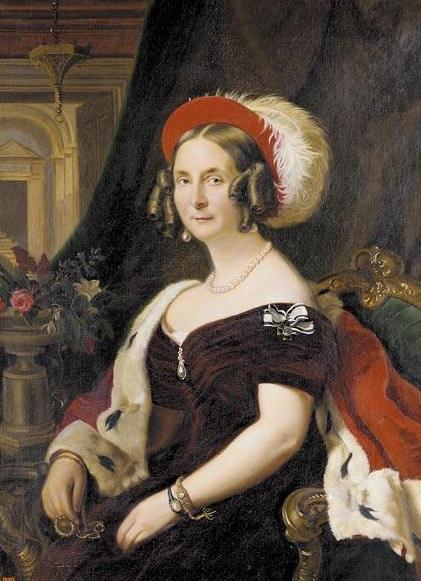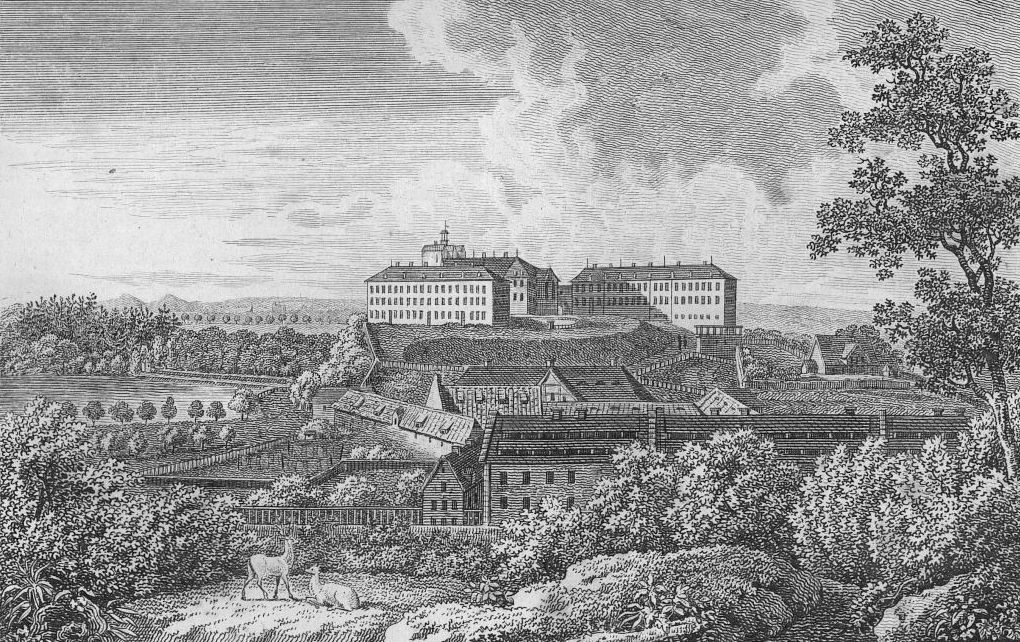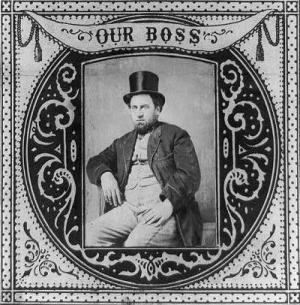|
Leopold IV, Duke Of Anhalt-Dessau
Leopold IV Frederick, Duke of Anhalt (1 October 1794 – 22 May 1871) was a German prince of the House of Ascania. From 1817 until 1853 he was ruler of the duchy of Anhalt-Dessau and from 1847 until 1853 also ruler of the duchy of Anhalt-Köthen. From 1853 until 1863 he was the ruler of the joined duchy of Anhalt-Dessau-Köthen and from 1863 the first ruler of the united duchy of Anhalt. Early life Leopold was born in Dessau on 1 October 1794 as the eldest son of Frederick, Hereditary Prince of Anhalt-Dessau, by his wife Landgravine Amalie of Hesse-Homburg, daughter of Frederick V, Landgrave of Hesse-Homburg. Following the premature death of his father in 1814, he became heir to the duchy of Anhalt-Dessau. Reign Following the death of his grandfather Leopold III he succeeded as duke on 9 August 1817. During the Revolutions of 1848 he was forced to grant a constitution to Dessau on 29 October 1848. It was revoked, however, on 4 November 1849, then replaced with a new version ... [...More Info...] [...Related Items...] OR: [Wikipedia] [Google] [Baidu] |
Princess Frederica Of Prussia (1796–1850)
Princess Frederica of Prussia (30 September 1796 – 1 January 1850) was a daughter of Prince Louis Charles of Prussia and Frederica of Mecklenburg-Strelitz. She was a member of the House of Hohenzollern. By her marriage to Leopold IV, Duke of Anhalt-Dessau, she would become Duchess consort of Anhalt-Dessau. Family Frederica was the youngest child and only daughter of Prince Louis Charles of Prussia and his wife Frederica of Mecklenburg-Strelitz. Her father was a younger son of Frederick William II of Prussia. Due to her mother's later marriages, Frederica would have many half-siblings, including George V of Hanover. Marriage and children On 18 April 1818, Frederica married Leopold IV, Duke of Anhalt in Berlin.Martin, pp. 187-188. They had been engaged since 17 May 1816, as the connection had already been arranged by the Prussian court. This dynastic connection was an expression of Leopold's pro-Prussian policies. They had six children: Frederica died on 1 January 1850 i ... [...More Info...] [...Related Items...] OR: [Wikipedia] [Google] [Baidu] |
Wilhelm Christian Raster
Wilhelm Christian Raster was a German people, German administrative officer ''(Verwaltungsbeamter)'' in the Anhalt-Dessau, Duchy of Anhalt-Dessau in the first half of the 19th century. He served as the Collector of Customs and Excise for the Duchy and maintained a close relationship with Leopold IV, Duke of Anhalt, Duke Leopold IV. Raster had a passion for languages (himself being fluent in four) and was noted for translating a number of Lord Byron, Lord Byron's works from English into German. He had a friendship with the poet Friedrich von Matthisson, which was said to have a profound effect on his son, Hermann. The elder Raster encouraged his son to study philology and linguistics at the universities in University of Leipzig, Leipzig and University of Berlin, Berlin. Despite his linguistically-oriented education, the younger Raster eventually went into politics and journalism and immigrated to the United States following his participation in the Revolutions of 1848. References ... [...More Info...] [...Related Items...] OR: [Wikipedia] [Google] [Baidu] |
Frederica Of Mecklenburg-Strelitz
Frederica Louise Caroline Sophie Alexandrina of Mecklenburg-Strelitz (german: Friederike Louise Caroline Sophie Alexandrine; 3 March 1778 – 29 June 1841) was a German princess who married successively Prince Louis Charles of Prussia, Prince Frederick William of Solms-Braunfels, and her first-cousin Prince Ernest Augustus, Duke of Cumberland (later King of Hanover). She became a British princess and Duchess of Cumberland when she married Ernest Augustus, the fifth son and eighth child of King George III and Queen Charlotte, her paternal aunt. Frederica was Queen of Hanover from Ernest's accession as king on 20 June 1837 until her death in 1841. Frederica was born in the ''Altes Palais'' of Hanover. She was the fifth daughter of Charles II, Duke of Mecklenburg-Strelitz, and his first wife, Princess Friederike of Hesse-Darmstadt.Willis, Daniel A., ''The Descendants of King George I of Great Britain'', Clearfield Company, 2002, p. 73. Her father assumed the title of Grand Duke ... [...More Info...] [...Related Items...] OR: [Wikipedia] [Google] [Baidu] |
Frederick William III Of Prussia
Frederick William III (german: Friedrich Wilhelm III.; 3 August 1770 – 7 June 1840) was King of Prussia from 16 November 1797 until his death in 1840. He was concurrently Elector of Brandenburg in the Holy Roman Empire until 6 August 1806, when the Empire was dissolved. Frederick William III ruled Prussia during the difficult times of the Napoleonic Wars. The king reluctantly joined the coalition against Napoleon in the . Following Napoleon's defeat, he took part in the Congress of Vienna, which assembled to settle the political questions arising from the new, post-Napoleonic order in Europe. His primary interests were internal – the reform of Prussia's Protestant churches. He was determined to unify the Protestant churches to homogenize their liturgy, organization, and architecture. The long-term goal was to have fully centralized royal control of all the Protestant churches in the Prussian Union of Churches. The king was said to be extremely shy and indecisive. His wife ... [...More Info...] [...Related Items...] OR: [Wikipedia] [Google] [Baidu] |
Prince Louis Charles Of Prussia
, house =Hohenzollern , father =Frederick William II of Prussia , mother =Frederika Louisa of Hesse-Darmstadt , birth_date = , birth_place =Berlin, Prussia , death_date = , death_place = Prince Frederick Louis Charles of Prussia (german: Friedrich Ludwig Karl; Potsdam, 5 November 1773 – Berlin, 28 December 1796) was the second son and third child of Frederick William II of Prussia and Frederika Louisa of Hesse-Darmstadt. Biography Marriage and issue On 26 December 1793 in Berlin, Prussia, Prince Louis married Duchess Frederica of Mecklenburg-Strelitz, youngest daughter of Charles II, Grand Duke of Mecklenburg-Strelitz and sister of Louise of Mecklenburg-Strelitz, wife of his brother Frederick. They had three children: * Prince ''Frederick'' Wilhelm Ludwig of Prussia (30 October 1794 - 27 July 1863); married Princess Luise of Anhalt-Bernburg (1799–1882); father of Prince George and Prince Alexander ... [...More Info...] [...Related Items...] OR: [Wikipedia] [Google] [Baidu] |
Berlin
Berlin ( , ) is the capital and largest city of Germany by both area and population. Its 3.7 million inhabitants make it the European Union's most populous city, according to population within city limits. One of Germany's sixteen constituent states, Berlin is surrounded by the State of Brandenburg and contiguous with Potsdam, Brandenburg's capital. Berlin's urban area, which has a population of around 4.5 million, is the second most populous urban area in Germany after the Ruhr. The Berlin-Brandenburg capital region has around 6.2 million inhabitants and is Germany's third-largest metropolitan region after the Rhine-Ruhr and Rhine-Main regions. Berlin straddles the banks of the Spree, which flows into the Havel (a tributary of the Elbe) in the western borough of Spandau. Among the city's main topographical features are the many lakes in the western and southeastern boroughs formed by the Spree, Havel and Dahme, the largest of which is Lake Müggelsee. Due to its l ... [...More Info...] [...Related Items...] OR: [Wikipedia] [Google] [Baidu] |
Frederica Wilhelmina Of Prussia
Princess Frederica of Prussia (30 September 1796 – 1 January 1850) was a daughter of Prince Louis Charles of Prussia and Frederica of Mecklenburg-Strelitz. She was a member of the House of Hohenzollern. By her marriage to Leopold IV, Duke of Anhalt-Dessau, she would become Duchess consort of Anhalt-Dessau. Family Frederica was the youngest child and only daughter of Prince Louis Charles of Prussia and his wife Frederica of Mecklenburg-Strelitz. Her father was a younger son of Frederick William II of Prussia. Due to her mother's later marriages, Frederica would have many half-siblings, including George V of Hanover. Marriage and children On 18 April 1818, Frederica married Leopold IV, Duke of Anhalt-Dessau in Berlin.Martin, pp. 187-188. They had been engaged since 17 May 1816, as the connection had already been arranged by the Prussian court. This dynastic connection was an expression of Leopold's pro-Prussian policies. They had six children: Frederica died on 1 January ... [...More Info...] [...Related Items...] OR: [Wikipedia] [Google] [Baidu] |
Alexander Karl, Duke Of Anhalt-Bernburg
, house = Ascania , father = Alexius Frederick Christian, Duke of Anhalt-Bernburg , mother = Marie Friederike of Hesse-Kassel , birth_date = , birth_place = Ballenstedt, Duchy of Anhalt-Bernburg, Holy Roman Empire , death_date = , death_place = Hoym, Anhalt-Bernburg, German Confederation , burial_date = , burial_place = , religion = Alexander Charles, Duke of Anhalt-Bernburg (2 March 1805 – 19 August 1863) was a German prince of the House of Ascania. From 1834 until 1863 he was the last duke of the Duchy of Anhalt-Bernburg. Life Early life Alexander Charles was born at Ballenstedt on 2 March 1805 as the second (but eldest and only surviving) son of Alexius Frederick Christian, Duke of Anhalt-Bernburg, by his first wife Maria Fredericka, daughter of William I, Elector of Hesse. Succession After the death of his father in 1834, Alexander Karl succeeded him in Anhalt-Bernburg. Marriage In Gottorp on 30 October 1834 Alexander ... [...More Info...] [...Related Items...] OR: [Wikipedia] [Google] [Baidu] |
Anhalt-Bernburg
Anhalt-Bernburg was a principality of the Holy Roman Empire and a duchy of the German Confederation ruled by the House of Ascania with its residence at Bernburg in present-day Saxony-Anhalt. It emerged as a subdivision from the Principality of Anhalt from 1252 until 1468, when it fell to the Ascanian principality of Anhalt-Dessau. Recreated in 1603, Anhalt-Bernburg finally merged into the re-unified Duchy of Anhalt upon the extinction of the line in 1863. History It was created in 1252, when the Principality of Anhalt was partitioned among the sons of Henry I into Anhalt-Aschersleben, Anhalt-Bernburg and Anhalt-Zerbst. Bernburg was allotted to Henry's second son Bernhard I. When the line of Anhalt-Aschersleben became extinct in 1315, Prince Bernhard II of Anhalt-Bernburg claimed their territory, he could however not prevail against his cousin Albert, Bishop of Halberstadt. After the ruling family became extinct upon the death of Prince Bernhard VI in 1468, Anhalt-Bernburg w ... [...More Info...] [...Related Items...] OR: [Wikipedia] [Google] [Baidu] |
Henry, Duke Of Anhalt-Köthen
Henry of Anhalt-Köthen (30 July 1778, Pszczyna Castle, Schloss Pszczyna, Pless23 November 1847, Köthen) was a German prince of the House of Ascania, ruler of the non-sovereign principality of Duchy of Pless, Anhalt-Pless and the last ruler of the duchy of Anhalt-Köthen. Life He was the fourth (but third surviving) son of Frederick Erdmann, Prince of Anhalt-Pless, by his wife, Louise Ferdinande, daughter of Henry Ernest of Stolberg-Wernigerode, Henry Ernest, Count of Stolberg-Wernigerode. In 1796, he joined the Prussian army. During the campaign of 1806, he attained the rank of major. Before his retirement from active service, Henry was elevated to the rank of ''Major General, Generalmajor''. After his elder brother Frederick Ferdinand, Duke of Anhalt-Köthen, Frederick Ferdinand inherited Anhalt-Köthen in 1818, Henry assumed the government over the state country of Pless. When Frederick Ferdinand died in 1830, Henry succeeded him in Köthen, whereas he left Pszczyna, Pless to ... [...More Info...] [...Related Items...] OR: [Wikipedia] [Google] [Baidu] |
United States
The United States of America (U.S.A. or USA), commonly known as the United States (U.S. or US) or America, is a country primarily located in North America. It consists of 50 states, a federal district, five major unincorporated territories, nine Minor Outlying Islands, and 326 Indian reservations. The United States is also in free association with three Pacific Island sovereign states: the Federated States of Micronesia, the Marshall Islands, and the Republic of Palau. It is the world's third-largest country by both land and total area. It shares land borders with Canada to its north and with Mexico to its south and has maritime borders with the Bahamas, Cuba, Russia, and other nations. With a population of over 333 million, it is the most populous country in the Americas and the third most populous in the world. The national capital of the United States is Washington, D.C. and its most populous city and principal financial center is New York City. Paleo-Americ ... [...More Info...] [...Related Items...] OR: [Wikipedia] [Google] [Baidu] |
Political Boss
In politics, a boss is a person who controls a faction or local branch of a political party. They do not necessarily hold public office themselves; most historical bosses did not, at least during the times of their greatest influence. Numerous officeholders in that unit are subordinate to the single boss in party affairs. Bosses may base their power on the support of numerous voters, usually organized voting blocs, and manage a coalition of these blocs and various other stakeholders. When the party wins, they typically control appointments in their unit, and have a voice at the higher levels. Reformers typically allege that political bosses are corrupt. This corruption is usually tied to patronage; the exchange of jobs, lucrative contracts and other political favors for votes, campaign contributions and sometimes outright bribes. History The appearance of bosses has been common since the Roman Republic, and remains fairly common or maybe widespread today. In Spanish America, Braz ... [...More Info...] [...Related Items...] OR: [Wikipedia] [Google] [Baidu] |


_crop.jpg)



